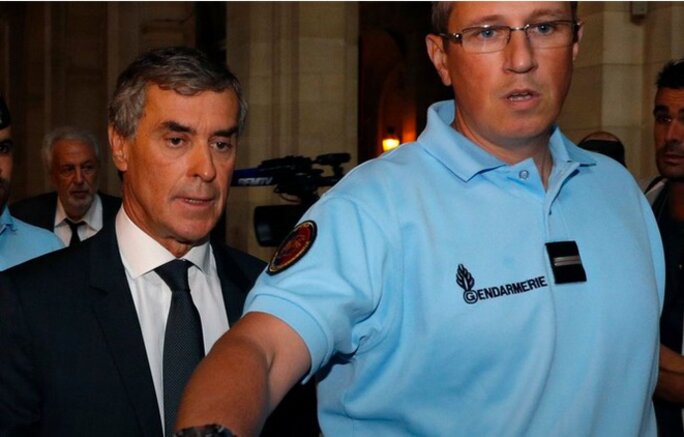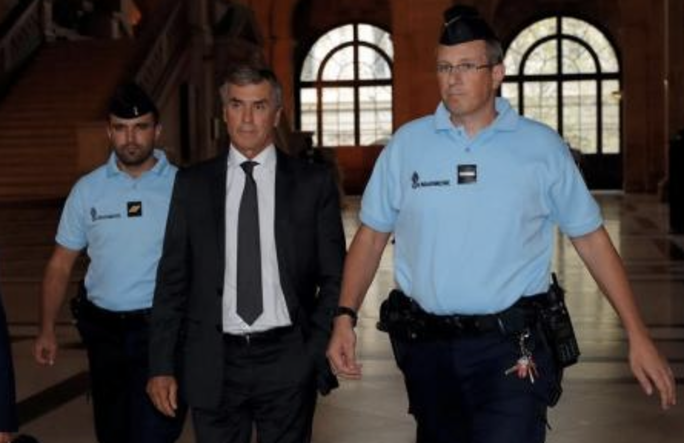A Paris court on Wednesday found former French budget minister Jérôme Cahuzac, 64, guilty of tax fraud and moneylaundering the proceeds of tax fraud and sentenced him to three years in prison and a five-year ban on holding elected office.
Cahuzac’s former wife Patricia, 60, who was also tried on charges of tax fraud and moneylaundering the proceeds of the fraud, was handed a two-year prison sentence.
Following the announcement of the verdict late Thursday morning, Jérôme Cahuzac immediately launched an appeal against the sentence, which allows him to remain free until the challenge is heard in court.
Thursday’s ruling marked four years, almost to the day, since Mediapart published on December 12th 2012 its first article revealing the secret foreign bank account of the then-socialist budget minister, who was at the time in charge of a crackdown on tax evasion.
During four months Cahuzac vehemently denied holding a secret foreign bank account, both before parliament and in interviews with the media, (notably in this interview, in French, with BFMTV ), and was given the support of President François Hollande’s government. Mediapart, meanwhile, was attacked by a number French politicians and media commentators for a supposed with-hunt against the minister, despite its publication of damning evidence of the scam, including a secret tape recording of Cahuzac in which he spoke of his account (see our ‘A-Z of the Cahuzac affair’ here).
But on April 2nd 2013 Cahuzac finally confessed to holding the account, which was opened with Swiss bank UBS 20 years earlier, in 1993, before being transferred for added secrecy to Singapore. He said he had been trapped in a “spiral of lies” and begged the French public to forgive him. The ensuing judicial investigation found that his former wife Patricia, with whom Cahuzac once ran a lucrative hair transplant clinic, had hidden even vaster sums from the tax authorities. These were from the proceeds of her hair transplant business which operated both in the French capital and in London.
The couple met during their medical studies during the late 1970s. Jérôme Cahuzac trained as a cardiologist, entering active politics in the latter part of the 1980s in the then-socialist government’s health ministry. In the early 1990s he became a lobbyist for the pharmaceutical industry, the source of part of the sums he hid abroad, and became a partner with Patricia, a dermatologist, in a hair transplant business.
Cahuzac returned to active politics after his election as a Member of Parliament in 1997 for a constituency in south-west France, where he also became mayor of the town of Villeneuve-sur-Lot. He became a minister after the socialist victory in presidential and parliamentary elections in 2012.
Jérôme and Patricia Cahuzac stood trial in Paris in September, and the delayed verdict announced on Thursday, following the deliberations of a panel of magistrates presided by Judge Peimane Ghaleh-Marzban, precisely met the recommendations of the public prosecutors.

Enlargement : Illustration 2

Dressed in a black jacket and tie over a white shirt, Cahuzac arrived at the chamber in the central Paris law courts building on Thursday morning accompanied by his legal team. After the announcement of the verdict, he sat for several minutes prostrate and with his head bowed. He remained in the chamber for about ten minutes after the public were ushered out, talking on his mobile phone. Just before leaving, he told public prosecutor Éliane Houlette “you’ve done your job”.
Houlette and her colleague Jean-Marc Toublanc led the case against Cahuzac at the trial in September. Both are members of the special financial crime department of the Paris public prosecutor’s office, the PNF, which was created as a direct result of the investigation into the Cahuzac couple.
The tax evasion scam was mounted with the active assistance of Swiss banker François Reyl and his Geneva-based bank Reyl et Compagnie, together with Dubai-based French lawyer Philippe Houman, who helped manage the offshore structures through which Cahuzac’s hidden wealth transited. Reyl and Houman were each handed a one-year suspended prison sentence, while the bank was fined 1.875 million euros. The defendants were also ordered to pay damages and interest payments on the sums hidden, which come on top of the tax adjustments already paid by Jérôme and Patricia Cahuzac.
According to the calculations of the PNF financial crime prosecution service, Jérôme and Patricia Cahuzac had secretly siphoned off into hidden accounts a total of 3.5 million euros over a period of 20 years. This included 600,000 euros stashed in Jérôme Cahuzac’s offshore bank account, 239,000 euros dissimulated in an account belonging to his mother, and 2.3 million euros in Patricia Cahuzac’s secret accounts, including one in the Isle of Man and another in Switzerland. But these, the court was told during the September trial, were only what could be firmly established and did not include lavish spending with sums unaccounted for.
Detailing the verdict on Thursday, the president of the 32nd Paris magistrates’ court, Peimane Ghaleh-Marzban, underlined the permanent and repeated intent to evade taxation that had been demonstrated by the Cahuzacs over a period of two decades, aided by the Reyl bank and its intermediaries.
'It is the trial of betrayal'
During the September trial, Jérôme Cahuzac claimed that he first opened the bank account in Switzerland so that it could be used as a source of secret political funds for the late Michel Rocard, a leading French socialist figure and who was prime minister (1988-1991) when Cahuzac was an advisor to the health ministry. Cahuzac claimed the funding for Rocard, who he said was personally unaware of the arrangement, was made by pharmaceutical firms and was to be used to promote Rocard’s movement within the Socialist Party. Rocard died in July this year.
Judge Ghaleh-Marzban on Thursday said that the court had found “no element to confirm or invalidate” Cahuzac’s claim that the account was to be used for Rocard.
Jérôme Cahuzac had continued with the tax fraud after becoming head of the law commission of the French lower house, the National Assembly, in 2010, and subsequently after he was appointed budget minister in the new socialist government in 2012, when he was in charge of a high-profile crackdown on tax evasion, and confessed to the scam only after a judicial investigation was launched (following Mediapart’s revelations). That, said Judge Ghaleh-Marzban on Thursday, represented a “total loss of bearings” and a “criminal fault of exceptional gravity” that demanded a prison term.

During the trial in September, vice-prosecutor Jean-Marc Toublanc said of Cahuzac that “the hearings demonstrated it, he in fact proceeded over 20 years with dissimulations, hidden accounts, tax fraud and [financial] structures”. He told the judges that “your ruling will be essential for maintaining the cohesion of the country around its fundamental values”.
Chief prosecutor Eliane Houlette spoke at the trial of Cahuzac’s “perpetual refusal” to pay taxes. Referring to his good upbringing and education, she said he had “debased all [his] skills in order to place them at the service of the lie, of deceit and the lure of gain”.
“It is the trial of betrayal,” said Houlette, addressing Cahuzac directly. “Betrayal of your education, of your duties as a citizen, of your doctor’s oath, of the trust of your electorate, and above all of [French] Republican institutions, by accepting eminent office.”
“What cannot be repaired is the damage to the image and reputation of this country, which was the laughing stock of Europe, appearing to be corrupt,” she told Cahuzac. “By your [ministerial] office, you have caused considerable damage to France. Citizens have the need to believe in the grandeur of their country. You have reduced the honour of this country. You have sacrificed all the principles, through seeking personal ambition and by the lure of gain.”
“Tax fraud in France cost between 60 and 80 billion euros per year,” Houette continued. “It is a prime example of an anti-social act. To commit tax fraud is to fail to meet one’s duty as a citizen, and there is no benevolence to expect from us.”
During the trial, the prosecution called for the two-year prison sentence for Cahuzac’s wife who, it said, had acted “without any scruple”. But the prosecutors underlined that it was Jérôme Cahuzac who in person signed off the couple’s yearly tax returns statement.
Cahuzac said at his trial that he could no longer find work in France, where “my political life is terminated”, following police investigations into the financial records of the different drugs firms for whom he had worked as a consultant. One of his two lawyers, Jean-Alain Michel, a personal friend of Cahuzac’s, argued that the disgraced former minister had already paid dearly for his crime, and called for a “just sentence”, proposing that he could work as a replacement general practitioner in the village in Corsica where his parents own a house.
His other lawyer, Jean Veil, told the court that, while French prisons suffer from overcrowding, “I would not want my taxes to go into locking away Jérôme Cahuzac, to pay his guards, hostelry and catering”.
The appeal hearing requested by Cahuzac, which effectively amounts to a retrial, is not expected to be held before several months.
-------------------------
The French version of this report can be found here.
English version by Graham Tearse


